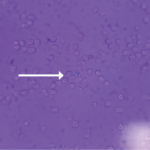Rheumatology practices with laboratory testing facilities in their offices can offer important benefits to patients and physicians. During their care of patients with musculoskeletal and rheumatic diseases, rheumatologists may order many tests, including erythrocyte sedimentation rate, synovial fluid analysis, complete blood count, fecal occult test, and urinalysis. While the prompt receipt of test results and the capability to evaluate specimens in the office directly improves efficiency, it is important to remember that offices must be certified to perform laboratory testing, particularly high-complexity tests such as the analysis of synovial fluids.
In the analysis of synovial fluid, the fluid is initially analyzed for color and clarity. It is then examined microscopically for cell counts, crystals (in the case of gout), and bacteria by Gram staining. If infection is a concern, a sample will be cultured.
Because a specific level of expertise is needed for interpreting the results of the crystals by polarization microscopy, the synovial fluid test cannot be classified as a waived test, which the Food and Drug Administration defines as “simple laboratory examinations and procedures that have been cleared for home use.” Waived tests use techniques that are so straightforward and precise that if these tests were performed incorrectly it would pose no reasonable risk of harm to the patient.
Synovial fluid testing, however, should be done by a rheumatologist with experience performing these tests in a laboratory to ensure he or she has the level of skill for proper interpretation.
The ACR believes that all laboratories, including physician-office laboratories, should participate in appropriate quality standards as defined by the Clinical Laboratory Improvement Amendment.
For more information on lab tests or for practice management questions, contact Melesia Tillman, CPC, or Antanya Chung, CPC, at (404) 633-3777.

